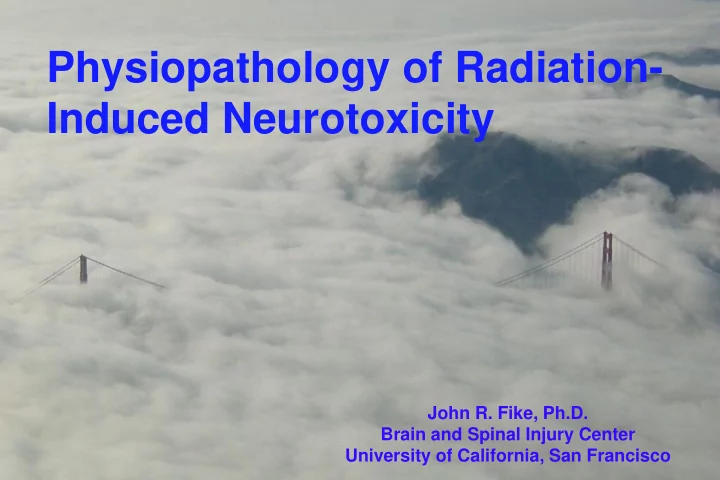

Physiopathology of Radiation- Induced Neurotoxicity John R. Fike, Ph.D. Brain and Spinal Injury Center University of California, San Francisco
Clinical Radiation Exposure of the Brain ~ 1,400,000 new cancer cases are expected in the US/year Includes primary brain tumors (~ 20,000); Brain metastases will occur in 20-40% of these patients; Currently ~ 200,000 patients/year receive large field or whole brain irradiation.
Radiation Brain Injury After ‘ Higher Doses ’ • Generally restricted to white matter; • Generally a late effect, appearing after a latent period; • Imaging and clinical changes; • Histology: demyelination, vascular damage, necrosis.
‘ Low Dose ’ Radiation Brain Injury: Cognitive Impairment • Progressive cognitive impairment occurs in up to 50% of long-term brain tumor survivors (> 6 months); • No obvious imaging/tissue changes; • Currently untreatable; • Unknown pathogenesis but hippocampus is often involved. • Understanding the factors involved may provide insight for the development of treatment strategies.
The Dogma “ In adult centres the nerve paths are something fixed, ended, immutable. Everything may die, nothing may be regenerate. ” Degeneration and Regeneration of the Nervous System Santiago Ramon y Cajal, 1913
Neurogenic Zones of the Mammalian Forebrain
Hippocampus • An integral part of the temporal lobe memory system. • An active site of neurogenesis
New Neurons are Integrated Into the Hippocampal Circuitry *
Do Early Effects in the SGZ Translate into Later Changes in Neurogenesis?
Effects of X-rays on New Neuron Production in the Mouse SGZ O O 90 O X O O O 75 X O Percent O 60 O O X O 45 O 30 O O O 15 X Neu N 0 O 0 2 4 6 8 10 Dose (Gy) Mizumatsu et al, Can Res 2003
Changes in Neurogenesis are Persistent After X-Irradiation Rola et al Exp. Neurol. 2004
Are Changes in Neurogenesis Associated with Functional Impairments?
Barnes Maze Performance of Control and Irradiated Mice (Hippocampal Dependent Learning) Distance (cm) Raber et al, Rad. Res. 2004
Changes in Neurogenesis (and Cognitive Impairment?) are Influenced by Microenvironmental Factors Inflammation Oxidative Stress
Activated Microglia Increase After Irradiation
Association Between New Neuron Production and Inflammation After Irradiation Neurons Activated Microglia
Changes in Neurogenesis (and Cognitive Impairment?) are Influenced by Microenvironmental Factors Inflammation Oxidative Stress
Oxidative Stress, Detected by 4-Hydroxynonenal, is Increased in Mouse Brain 2 Months After 5 Gy Control Irradiated
Irradiation Induces Oxidative Stress in Cells/Tissues Irradiation Lipid oxidation Protein oxidation - O 2 SOD-Me + H 2 O 2 Catalase GPx H 2 O
Superoxide Dismutase • SOD1 (Cu/Zn SOD): Cytosolic • SOD2 (MnSOD): Mitochondrial • SOD3 (EC-SOD): Extracellular
EC-SOD Deficiency Leads to Indications of Oxidative Stress 4-Hydroxynonenal Nitrotyrosine WT EC-SOD KO Rola et al, Free Rad. Biol. Med. 2007
Lack of EC-SOD Does Not Induce Compensatory Changes in Other Antioxidant Enzymes 0 Gy 5 Gy
Lack of EC-SOD Does Not Induce Compensatory Changes in SOD1 or SOD2 Activities 0 Gy 5 Gy
SOD Deficiency and its effects on Neurogenesis in the Dentate SGZ
Hippocampal-Dependent Contextual Fear Conditioning After Irradiation (10 Gy) in WT and SOD3 Deficient Mice Contextual Fear Raber et al, Hippocampus 2011
Does Irradiation Disrupt Neuronal Function in the Dentate Gyrus?
Behavioral Exploration Induces Immediate Early Genes Caged Control Arc zif268 cfos Rosi et al, Can. Res. 2008
Immediate Early Gene Arc (activity-regulated cytoskeleton-associated protein): A molecular marker of neuronal activity during learning and memory • Arc is tightly coupled to behavioral encoding of information in neuronal circuits • Arc protein is required for learning and memory consolidation; • Arc KO mice are cognitive impaired for hippocampal tasks;
Experimental Approach to detect Arc mRNA and Arc Protein Caged 25 ’ 1st 5' Exploration 2nd 5' Exploration Fluorescence in situ hybridization (FISH) detects Arc mRNA Fluorescence immunostaining detects Arc protein
Arc is Dynamically Regulated Arc mRNA foci observed within 5 min of behavioral exploration Arc mRNA translocated to the cytoplasm 8- 10 min later Arc protein detected in the cytoplasm ~30 min later Cytoplasmic Arc mRNA from 1 st exploration and Arc foci from the 2 nd exploration
Arc Protein Expressed in Newly Born Neurons in the Dentate SGZ Arc Protein = Red H 2 O 2 + O 2 BrdU = Green NeuN = Blue
X-irradiation Reduces Arc Expression in the Dentate Gyrus Arc mRNA Arc Prot. Caged Controls O Gy Behavior 10 Gy Behavior Rosi et al, Can. Res. 2008
X-Irradiation Affects the Molecular Distribution of Arc at the Level of mRNA and Protein Rosi et al, Can. Res. 2008
The % of Neurons Expressing Arc mRNA (A) and Arc Protein (B) are Correlated with Numbers of Activated Microglia After Irradiation R 2 = 0.54 R 2 = 0.66
Summary • Neurogenesis and Arc expression are sensitive to irradiation; • Changes in neurogenesis are associated with cognitive impairments; • Environmental context (inflammation/oxidative stress) may be critical factors in the evolution and treatment of cognitive impairment; • A better understanding of these processes may provide insight into new strategies to ameliorate or treat the adverse effects of brain irradiation.
Acknowledgments • UC San Francisco • NIH R01 NS46051, • NIH R33 AI080531 Susanna Rosi • DOD: DAMD17-01-1-0820 Radoslaw Rola • NASA NNJ04HC90G Kelly Fishman • NASA NNJ05HE33G Jennifer Baure Marta Andres-Mach • UC Irvine Charles L. Limoli • Stanford Univ . Ting Ting Huang • Ore. Health Sciences Univ. Jacob Raber
Recommend
More recommend